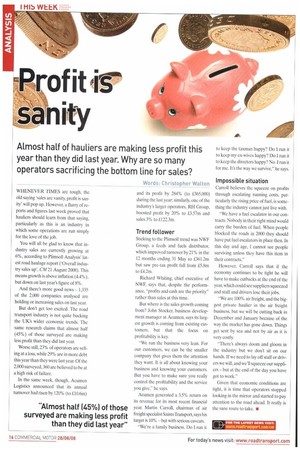Prof it irc
Page 16

If you've noticed an error in this article please click here to report it so we can fix it.
nity
Almost half of hauliers are making less profit this year than they did last year. Why are so many operators sacrificing the bottom line for sales?
Words: Christopher Walton WHENEVER TIMES are tough, the old saying 'sales are vanity, profit is sanity' will pop up. However, a flurry of reports and figures last week proved that hauliers should learn from that saying, particularly as this is an industry in which some operations are run simply for the love of the job.
You will all be glad to know that industry sales are currently growing at 6%, according to Plimsoll Analysis' latest road haulage report ('Overall industry sales up', CM 21 August 2008). This means growth is above inflation (4.4%), but down on last year's figure of 8%.
And there's more good news — 1,335 of the 2.000 companies analysed are holding or increasing sales on last year.
But don't get too excited. The road transport industry is not quite bucking the UK's wider economic trends. The same research claims that almost half (45%) of those surveyed are making less profit than they did last year.
Worse still, 23% of operators are selling at a loss, while 29% are in more debt this year than they were last year. Of the 2,000 surveyed, 360 are believed to be at a high risk of failure.
In the same week, though, Acumen Logistics announced that its annual turnover had risen by 120% (to £10.6m) and its profit by 284% (to £365,000) during the last year similarly, one of the industry's larger operators, RH Group, boosted profit by 20% to £3.57m and sales 30/0 to £122.3m.
Trend follower Sticking to the Plimsoll trend was NWF Group, a feeds and fuels distributor, which improved turnover by 21% in the 12 months ending 31 May to £361.2m but saw pre-tax profit fall from £5.8m to £4.2m.
Richard Whiting, chief executive of NWF, says that, despite the performance, "profits and cash are the priority" rather than sales at this time.
But where is the sales growth coming from? John Stocker, business development manager at Acumen, says its largest growth is coming from existing customers, but that the focus on profitability is key.
"We run the business very lean. For our customers, we can be the smaller company that gives them the attention they want. It is all about knowing your business and knowing your customers. But you have to make sure you really control the profitability and the service you give," he says.
Acumen generated a 35% return on its revenue for its most recent financial year. Martin Carroll, chairman of air freight specialist Saints Transport, says his target is 10% — but with serious caveats.
"We're a family business. Do I run it to keep the taxman happy? Do I run it to keep my ex-wives happy? Do I run it to keep the directors happy? No. I run it for me. It's the way we survive," he says.
Impossible situation Carroll believes the squeeze on profits through escalating running costs, particularly the rising price of fuel, is something the industry cannot just live with.
"We have a fuel escalator in our contracts. Nobody in their right mind would carry the burden of fuel. When people blocked the roads in 2000 they should have put fuel escalators in place then. In this day and age, I cannot see people surviving unless they have this item in their contracts."
However, Carroll says that if the economy continues to be tight he will have to make cutbacks at the end of the year, which could see suppliers squeezed and staff and drivers lose their jobs.
-We are 100% air freight, and the biggest private haulier in the air freight business, but we will be cutting back in December and January because of the way the market has gone down. Things get sent by sea and not by air as it is very costly.
"There's always doom and gloom in the industry but we don't sit on our hands. If we need to lay off staff or drivers we will, and we'll squeeze our suppliers — but at the end of the day you have got to work."
Given that economic conditions are tight, it is time that operators stopped looking in the mirror and started to pay attention to the road ahead. It really is the sane route to take. •




































































































































































